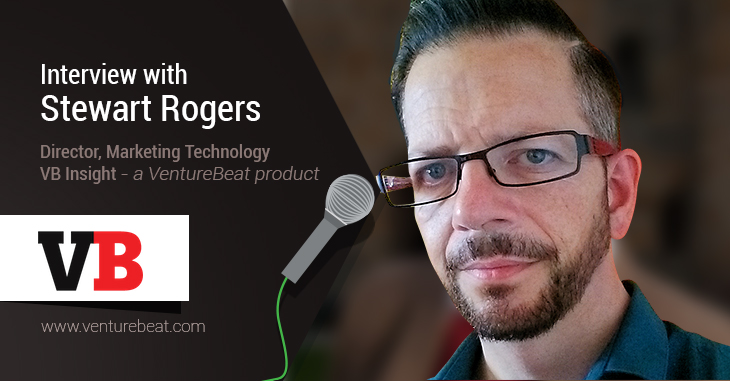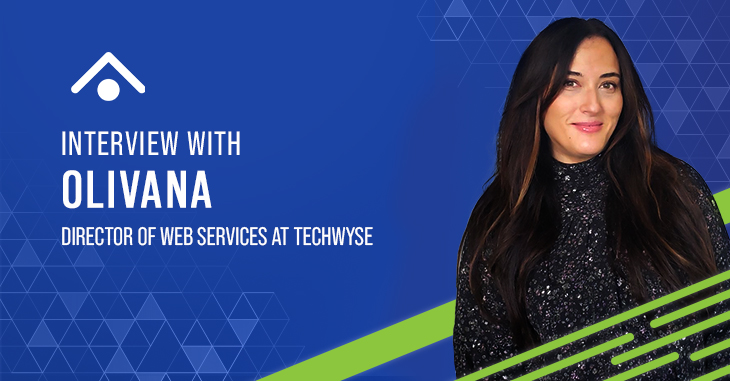Today, I have Stewart Rogers, Director of Marketing Technology at VB Insight - a VentureBeat product. He was the Head of Product at Salesformics, a CRM and marketing automation solution for small businesses built in the UK, where he was responsible for all aspects of product development, marketing, and sales.
Stewart is a contributor to several sales and marketing publications and books including, Email Marketing by the Numbers by Chris Baggott and Get Rich Blogging by Zoe Griffin. He is regularly invited to write or speak about sales, marketing, technology, social media, and other related topics.
Also on TechWyse
Interview with Annie Cushing @AnnieCushing from Annielytics.com
Interview with Dan Sharp, Director of Screaming Frog
Q. Tell us a little about yourself and what you do?
A. My role is threefold . On one side, I report marketing technology news for VentureBeat. The other two sides are wrapped up in a VentureBeat product called VB Insight. Think of VB Insight as both an app store - but instead of for apps, it is a store for research, studies, and analysis - and as VentureBeat’s research arm.
At VB Insight, I am part of the team that is helping to make it the best research resource available and also, the analyst that is trying to make sense of the marketing technology universe.
Q. As Director of Marketing Technology at VB Insight, what are your primary responsibilities and how challenging is the role as compared to your previous position at Crawford Technologies?
A. The two roles are very different, but they share a connection. At CrawfordTech, I spent my time at the sharp-end of marketing, using marketing technologies and techniques to help with demand and lead generation. At VB Insight and VentureBeat, I now analyze those technologies and use my experience to work out what will happen in the future of sales and marketing.
Q. How would you define CRO (Conversion Rate Optimization)? Apart from sales, what are some other worthwhile conversion goals to target and track?
A. CRO is a really interesting field. Essentially, it is the business of creating additional revenues for free! I’ll explain. Let’s say you get 10,000 page views per month on your website. 2% of those views turn into conversions of some kind; maybe a white paper download or a completed ‘contact us’ form. If you want to double your conversions, you have two choices: spend a lot of money on increasing your traffic to 20,000 page views or increase your conversion rate to 4%. The latter is virtually cost free, whereas the former can cost a fortune. In the end, CRO is really all about conversions, whatever that means to you and your business.
Q. Briefly, tell us about the recent study you did on Conversion optimization: how to win at performance marketing ?
A. It was a real eye-opener. At VB Insight, we don’t take sponsorship, payments, or directions from vendors or interested parties ahead of producing a report. Instead, we take multiple data sets - ‘small data’ solutions, such as survey respondents, and ‘big data’ techniques such as website scraping technologies. The results of analyzing those data sets tells us who comes out on top and who doesn't do as well. In this case, we studied 2,938 CRO tool users and gathered data from 3.1 million US business websites - among other sources - to create, what I believe, is the most extensive view of the CRO tool space.
Q. In the study, it mentioned:
“A study by SocialFlow, which analyzed data from 1.6 million organic (non-paid) social posts from Twitter, Facebook, and Google+, found that 99% of those updates create little to no engagement at all”
What are your thoughts on this? As a marketer, what should I do?
A. It is ironic, actually, that the article in which I revealed this statistic turned into one of my most shared stories on VentureBeat!
I have two rules for social media that have always helped me. First, if you find social media boring, I’m afraid you’re the problem. Following much more interesting people and that problem goes away. Second? Be interesting. That might help you when it comes to organic social messages, but for those of us that really need to make a splash on social media, the answer is - of course - to invest some money and treat it as you would any other advertising channel. That bypasses the 1% problem.
Q. According to the study, what are the most impactful elements to test and some of the most under-tested aspects of websites?
A. There is no simple answer to that question because every business, website, email, message, and piece of content that you can test is particular to that company, its marketplace, and its requirements. What is important, however, is to spend a good amount of time working out your test hypothesis. What are you going to test? Why? What data do you have to support the hypothesis? I will say, however, that most people only test visible aspects of websites. Studies show that the speed of your website, while having an SEO benefit, does increase conversions. Technical CRO is as important as testing graphical or textual changes. Oh, and don’t neglect email tests either.
Q. What are common mistakes that companies do during the CRO process?
A. The most common CRO mistake is not trusting the data. One truth about CRO; the data is the driver of all decisions, not the person with the highest pay grade. If you have a solid hypothesis,and have the right tools in place to test your changes, leave the test running as long as you can and trust the results, not personal opinions.
Q. In your opinion, what changes will we see in the CRO space over the next year? How will the tools mentioned in your study influence marketers? As of now, what features are lagging behind?
A. As with the analytics marketplace, where predictive solutions are starting to take hold, I can see CRO tools following suit. Instead of working through analytics to work out what tests might need to be run, tools will be launched that are constantly asking questions behind the scenes and they will then suggest, manage, and report on the changes that need testing. I can also see a new breed of vendors that attempt to consolidate all CRO techniques into a single tool; a ‘CRO cloud’ if you will, just like the ‘sales clouds’ and ‘marketing clouds’ that exist already. Most CRO tools, currently, focus on one or two CRO techniques, and not the whole shebang.
Q. In the study, you rated each CRO tool company with a “Market Penetration Score.” tell us how this score is calculated and if possible, share the score/ranking of each companies with us.
A. The market penetration score was based on the actual installs of CRO tools we found when scraping 3.1 million US businesses, along with other data sets that allowed us to determine the number of users a particular tool has. Google Analytics (GA) is, of course, the 300lb gorilla in this respect. It dwarfs the others in comparison. If you remove GA, the solutions with the highest penetration included, in order, Omniture, Crazy Egg, Optimizely, Chartbeat, Clicktale, and Visual Website Optimizer.
Q. You mentioned neuromarketing in your study, what exactly is neuromarketing and how does it affect conversion?
A. Neuromarketing is not a tool. It has been around for a decade now and is best explained as the study of how the brain responds to marketing stimuli. Big organizations are already hiring neuromarketers, ‘emotional marketers’, and psychologists to improve their CRO activities. As with all these things it usually follows that, over time, mid-range businesses will follow suit.
Q. Please share a few key takeaways from your study.
A. I think my favourite takeaway is just how effective CRO is. And remember, this is the raw data telling us this - not an analysts opinion. Of the CRO tools studied, only two failed to generate a substantial return on investment (ROI). Of the 2,938 marketers we surveyed, only five percent did not generate any ROI. In fact, the average ROI was 223.7 percent, but 173 of the marketers we surveyed had incredible returns of over 1,000 percent. That’s pretty amazing.
Q. Finally, are you an advocate of work/life balance? How do you balance both?
A. Sometimes I don’t! During the creation of the CRO report, which is 17,000+ words long, I had a single day where I started at 8 a.m., finished at 11 p.m., presented an hour-long webinar on my most recent State of Marketing Technology report, and still wrote 5,100 words. Importantly, I make time for my family, who are incredibly understanding, and to enjoy myself. I love my work, which helps, and I make sure I get time to do the things I enjoy outside of work too. Great time management tricks help too, but that’s a whole topic in itself that we can’t go into here.
Another big thanks to Stewart for taking the time to answer my questions.
What was your favourite part of this interview? Let us know in the comments below! If you’re interested in reading more SEO expert industry interviews from TechWyse, please visit SEO Expert Interviews.






